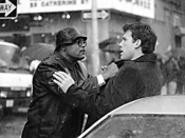If you think that sounds like a bit much for a star-driven vehicle fresh off the Paramount lot, you're right. But even if the ride's a little bumpy, with a final lap that's all too suspiciously smooth, you've gotta give director Roger Michell, best known for the superfluous Notting Hill, credit for trying. The most obvious inspiration is Joel Schumacher's Falling Down, with its split focus between two men beaten down by life and ad campaign that promises escapist violence that it doesn't deliver. Thankfully, Michell learned at least two things from Schumacher's mistakes: Sloppy racial stereotyping doesn't advance one's thesis, and making one character a lot more interesting than the other is just stupid.
Ben Affleck is Gavin Banek, a slick attorney who can't seem to get why people hate lawyers (and him) so much, even as he's persuading a senile philanthropist to sign over power of appointment to his firm. Samuel L. Jackson is Doyle Gipson, an insurance telemarketer who attends AA meetings when he's not trying desperately to win back custody of his children, whom he hopes to put up in the run-down Queens residence he's just about to buy. On a day that both need to be in court, Gavin rams Doyle's car off the road while talking on his cell phone (if this film encourages even one viewer to end this stupid practice, bravo). Since insurance is Doyle's field, he tries to do the right thing, while Gavin offers to write a blank check. But no, Doyle still wants to take down his insurance information. That Doyle doesn't take the blank check when we know he plans to take out a huge loan for the house is one leap in logic you have to accept for the rest of the film to work. It's a leap of logic Gavin can't accept and simply drives away, offering the less than hopeful benediction "Better luck next time."
Both men get screwed as a result. A crucial file ends up in Doyle's possession, but not before he misses his custody hearing and loses by default. Gavin, not having learned that bribery doesn't work, offers to buy Doyle a new car to get the file back. But when Doyle refuses, and it's explained to Gavin by his sleazy father-in-law (Sydney Pollack) that fraud and forgery will be their only recourse if it's not obtained, the game gets nasty. Conveniently for Gavin, his long-suffering secretary (Toni Collette) has a cyber-terrorist in her Rolodex, and this eager fellow (Happiness pedophile Dylan Baker, adding some much-needed evil laughter) promptly turns off Doyle's credit and renders him bankrupt. The tire iron comes into play later, but sadly not on Affleck's skull, where it belongs.
The script, by newcomer Chap Taylor and veteran Michael Tolkin, means to show two men trapped by circumstance: the rich boy gradually sacrificing his integrity and the hardworking man struggling for respect. They get many of the details right, from the casual, almost unintentional racism of the more-privileged ("You is now bankrupt!" proclaims Baker in pseudo-Ebonics) to the pathos of Doyle's rage when he tries to throw a computer through a plate glass window and neither breaks. At every moment, we see man's disconnect from his fellow man, whether in the trust that's placed in a faulty computer over another human, the neon sign inside an otherwise ornate Catholic church, or the numerous opportunities both characters have to step back and walk away rather than following the path of rage. It's a valuable statement, and unlike other movies with similar themes, Changing Lanes doesn't feel the need to culminate in an over-the-top orgy of rage and destruction.
Unfortunately, it does go for an equally predictable finish, which is disappointing but expected. You can practically hear the studio executive whispering over Michell's shoulder: "Make it more obvious! This subtlety shit doesn't play in the heartland!" So, long after you've gotten the point, Affleck is forced to spell out the movie's theme in full from inside a confessional. In movie world, this seems a familiar haven even (especially?) for non-Catholics. Amanda Peet, in a small role as Gavin's rich-bitch wife, gets an even cheesier and more blatant speech about the amorality of successful lawyers, though hers at least gets a decent punch line. And just so Affleck doesn't get all the moral to himself, Doyle gets a lecture from AA buddy William Hurt that'll make you cringe ("You're addicted to chaos! You're hooked on disaster!"). If you can roll with these moments, the rest of the film pays off, but even with a relatively happy ending (one that, given the characters in question, may not last), it's a heck of a downer for date night.










